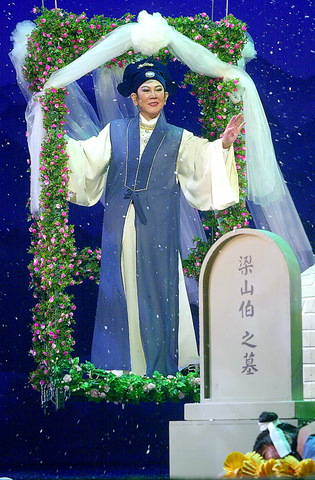The 1963 film The Love Eterne (
Riding on the success of the 2003 revival and hoping to attract a younger generation of theatergoers, Da Da Arts is reuniting actors from the original film and stage version and pairing them with a few younger TV celebrities.
The star of both the film and theater version, Ling Bo, together with Hu Chin (

PHOTO COURTESY OF DA DA ARTS
To appeal to a younger audience local television and film personalities, Guo Zhi-chien (
Ling, now 66-years-old, is embedded in the memories of women who watched her grace the screen as the young scholar in The Love Eterne. Four decades later, her facial expressions, movements and singing are as skillful as ever, said Da Da Arts producer, Melisa Jiao (
"Lin Bo is forever to be the leading lady as Liang Shan-bo there is nobody else could substitute her role?. The live performance is difficult for these aged actors, who have to memorize all the lyrics not to mention all the choreography, and it is difficult to get everyone together to rehearse and to perform on stage. But if we could get the original cast, then why not?" Jiao added.
The butterfly lovers, or the Legend of Liang Shan-bo and Chu Ying-tai as it was previously titled in the 2003 production, is regarded as the Chinese equivalent of Romeo and Juliet. Chu Ying-tai, born into a wealthy family, disguises herself as a man so she can attend school, where she befriends the handsome Liang Shan-bo, the only son in a poor family.
When Chu's secret is finally reviled to Liang the two fall in love, but are too late; it has been arranged that Chu will marry the son of a powerful court official. The ill-fated lovers die of broken hearts only to be reincarnated and reunited as butterflies.
The film The Love Eterne was so popular in Taiwan that many people can still sing the arias from memory. The question nowadays, is whether or not the popularity of huangmei musicals will continue. According to Da Da Arts organizers its days are not numbered.
"More teenagers are enjoying the show. Some have seen the original film or musical version on TV and many are fans of Ling Bo," Jiao said referring to a press conference where fans of Ling were invited to attend.
As of press time, most tickets for the Taipei dates were sold out. For more information on the show and additional tour dates check the Web site at www.dadaarts.com.tw.
Performance notes:
What: The Butterfly Lovers (The Legend of Liang Shan-bo and Chu Ying-tai)
When: Tonight and Tomorrow at 7:30pm with a Saturday matinee at 2:30pm
Where: CKS Cultural Center National Theater (
Tickets: NT$1,000-NT$2,500 available online at CKS Cultural Center Box Office or online at www.artsticket.com.tw
Telephone: (02) 3393 9888

In the March 9 edition of the Taipei Times a piece by Ninon Godefroy ran with the headine “The quiet, gentle rhythm of Taiwan.” It started with the line “Taiwan is a small, humble place. There is no Eiffel Tower, no pyramids — no singular attraction that draws the world’s attention.” I laughed out loud at that. This was out of no disrespect for the author or the piece, which made some interesting analogies and good points about how both Din Tai Fung’s and Taiwan Semiconductor Manufacturing Co’s (TSMC, 台積電) meticulous attention to detail and quality are not quite up to

April 21 to April 27 Hsieh Er’s (謝娥) political fortunes were rising fast after she got out of jail and joined the Chinese Nationalist Party (KMT) in December 1945. Not only did she hold key positions in various committees, she was elected the only woman on the Taipei City Council and headed to Nanjing in 1946 as the sole Taiwanese female representative to the National Constituent Assembly. With the support of first lady Soong May-ling (宋美齡), she started the Taipei Women’s Association and Taiwan Provincial Women’s Association, where she

Chinese Nationalist Party (KMT) Chairman Eric Chu (朱立倫) hatched a bold plan to charge forward and seize the initiative when he held a protest in front of the Taipei City Prosecutors’ Office. Though risky, because illegal, its success would help tackle at least six problems facing both himself and the KMT. What he did not see coming was Taipei Mayor Chiang Wan-an (將萬安) tripping him up out of the gate. In spite of Chu being the most consequential and successful KMT chairman since the early 2010s — arguably saving the party from financial ruin and restoring its electoral viability —

It is one of the more remarkable facts of Taiwan history that it was never occupied or claimed by any of the numerous kingdoms of southern China — Han or otherwise — that lay just across the water from it. None of their brilliant ministers ever discovered that Taiwan was a “core interest” of the state whose annexation was “inevitable.” As Paul Kua notes in an excellent monograph laying out how the Portuguese gave Taiwan the name “Formosa,” the first Europeans to express an interest in occupying Taiwan were the Spanish. Tonio Andrade in his seminal work, How Taiwan Became Chinese,